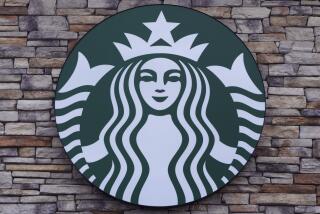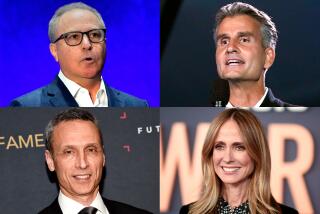Coca-Cola CEO Ivester to End Troubled Reign
- Share via
Coca-Cola Co.’s shares slumped more than 5% on Monday after the world’s largest beverage company announced unexpectedly that Chairman and Chief Executive M. Douglas Ivester would resign in April after less than 2 1/2 years on the job.
Ivester’s resignation sparked immediate questions about whether the 52-year-old executive was opting out of the top job for personal reasons or whether he was being eased out by a board of directors upset with a high-profile series of operating missteps.
Board members on Sunday named Douglas N. Daft, a 30-year Coke veteran credited with helping strengthen Coke’s presence in Asia, as president and chief operating officer. Daft, 56, will be elected chairman and CEO after Ivester’s retirement in April, according to the company.
Ivester’s departure marks the end of a brief chapter in the company’s 113-year history, one plagued by setbacks in Europe and sluggish volume growth. Ivester had been handpicked to succeed former Coke Chairman Roberto Goizueta, who died of cancer in October 1997.
A Coke spokesman said that Ivester called the special meeting Sunday at which he announced his plan to retire after the company’s annual shareholder meeting in April. Several beverage industry watchers said the timing of Ivester’s departure was unusual because the company seemed to have gotten its global act together.
“This really was a surprise,” said Gary Hemphill, vice president of New York-based Beverage Marketing Corp. “While 1999 was an extremely trying year, [the resignation] is not something that we anticipated.”
Coke’s stock, which has been struggling to rebound this year, fell $3.72 to $64.61 on the New York Stock Exchange on Monday.
Ivester, in a prepared statement, said it was “time for me to move on to the next stage of my life, and therefore, to put into place an orderly transition for this great company.” In a letter to employees, Ivester said he had “come to believe our company will now best be served by fresh leadership that will bring its own energy to bear.”
Coca-Cola board member James B. Williams said in a statement that the board “has reluctantly accepted” the decision by Ivester, who will serve as a consultant.
Some industry insiders questioned whether Ivester was the right executive to lead a company best known for its marketing prowess.
“Doug Ivester has had a bungled tenure in the company,” said former Coke marketing head Peter Sealey, now a consultant and an adjunct marketing professor at UC Berkeley. Sealey, who was fired by Ivester in 1993, maintained that Coke’s chairman “made a series of mistakes, and I think at a certain point, the board finally lost confidence and gave up on him.”
Shortly after Ivester took over as chairman, the company’s overseas sales stalled in the wake of an Asian economic collapse and worldwide currency fluctuations. Coke’s image was sullied--and Ivester’s own reputation was damaged--last summer when 250 Europeans reported falling ill after drinking Coke products. Critics contend that Ivester should have maintained a higher profile in dealing with the product contamination incident.
Ivester’s plan to build revenue by acquisitions was derailed this past year when European regulators blocked Coke’s bid for France’s Orangina brand soda on antitrust grounds and forced the company to scale back a planned acquisition of Cadbury Schweppes’ soft drink business.
At the same time, Coke was being sued by former and current employees who alleged racial discrimination at the company’s Atlanta headquarters.
Still, analysts believed the outlook for Coke was positive. Merrill Lynch & Co. analyst Douglas Lane in November declared Coke “our top pick for 2000 as global gets good again. Underlying fundamentals are improving, and the stock’s relative price-earnings ratio is at a 10-year low.”
But, observers say, Coke investors--represented by such well-known directors as Herbert A. Allen, Warren E. Buffett and Peter V. Ueberroth--might not have been willing to wait for Ivester to manage a return to Coke’s traditional 7% to 8% annual volume growth. Coke’s global volume grew 3% in the third quarter over the previous year and dropped 2% in the second quarter, mostly due to the European health scare.
Ivester joined Coca-Cola in 1979. He was named chief financial officer in 1985 and soon became a trusted lieutenant for Goizueta, who was recognized as one of the world’s most effective business leaders. Goizueta went against the grain--albeit with the board’s blessing--by choosing the finance executive to run a company best known for its marketing. John Sicher, editor of Beverage Digest, a Bedford Hills, N.Y.-based newsletter, suggested that the market’s dramatic reaction to word of Ivester’s departure “was driven more by surprise, by the reaction to change, than anything to do with Doug Daft, who’s a solid guy, a solid executive who gets much of the credit for building Coke sales in Asia, and who’s well-regarded by bottlers.”
Daft moved to Atlanta in 1991 to head sales in the Pacific region. In October, Daft added Coke’s Africa and new Schweppes Beverages division to his Middle and Far East duties, as part of a management restructuring in which Daft and two other executives ended up reporting directly to Ivester. Analysts at the time dismissed the notion that Coke had set up a horse race for Ivester’s job.
(BEGIN TEXT OF INFOBOX / INFOGRAPHIC)
The Coke Challenge
Coca-Cola clearly is ahead of archrival PepsiCo Inc. in their 100-year war, but its stock has lost much of its fizz. Under M. Douglas Ivester, the company has retained its lead over Pepsi, which has refined its game plan in recent years by selling off its fast-food restaurant division and shoring up its bottling system. Quarterly closes and latest for Coca-Cola:
*
M. Douglas Ivester’s tenure as CEO began Oct. 6, 1997.
Monday:
$64.61,
down $3.72
European contamination scare drags down stock price.
*
Coke’s To-Do List:
* Revive the flagship Coca-Cola brand, which, has suffered from slow domestic growth as younger consumers switch to Mountain Dew and Sprite.
* Polish an international image, particularly in Europe, where the brand’s reputation was dulled by last summer’s product contamination scare.
* Maintain Coca-Cola’s dominant position in the lucrative syrup market, where PepsiCo is a distant second. Keep exclusive arrangements with chains such as Burger King.
* Return the company to the 7% to 8% annual growth rate that investors expect.
*
Source: Bloomberg News
More to Read
Inside the business of entertainment
The Wide Shot brings you news, analysis and insights on everything from streaming wars to production — and what it all means for the future.
You may occasionally receive promotional content from the Los Angeles Times.










